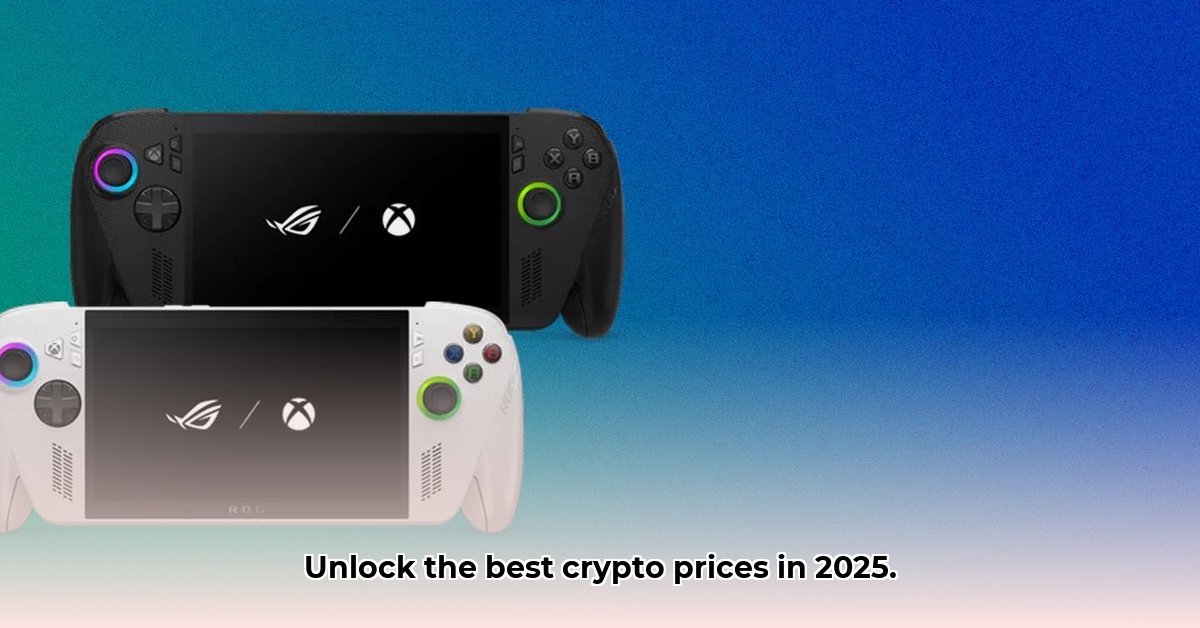Crypto investing can feel like navigating a maze, but equipping yourself with the right information is crucial for staying ahead. For real-time updates, check out these live crypto quotes. This guide serves as your roadmap to finding the perfect crypto price aggregator—a tool that consolidates price data from various exchanges. Whether you’re a beginner, seasoned trader, or developer, we’ll help you identify the best fit, comparing top platforms based on accuracy, ease of use, security, and features. Let’s embark on this journey to discover the ideal tool for your crypto endeavors!
Best Crypto Price Aggregator: Your 2025 Guide to Navigating the Crypto Market
Diving into cryptocurrency requires the right tools, particularly when tracking fluctuating prices. Cryptocurrency price aggregators compile data from various exchanges to provide a clearer understanding of the market dynamics and potential investment opportunities. This guide assists both seasoned experts and newcomers in selecting the perfect aggregator tailored to their needs and investment strategies. It will delve into the many options for crypto price aggregators, highlighting their features, pros, and cons to make an informed decision.
What to Look For in a Great Crypto Price Aggregator
Before exploring specific platforms, understanding the essential features of a reliable cryptocurrency price aggregator is vital. These features will streamline your crypto experience, enhancing data accessibility and informed decision-making. The selection of tools can make a big difference, according to experts. When evaluating crypto price aggregators, consider these key features:
- Data Coverage: The Wider, the Better: Ensure the aggregator covers the cryptocurrencies you’re interested in. This includes a broad selection of individual coins and tokens across numerous exchanges, offering a more complete view of the market. Check, too, if the aggregator covers different types of crypto assets, such as DeFi tokens or NFTs.
- Accuracy and Reliability: Truth in Numbers: A reliable aggregator uses trusted data sources and verification systems to ensure data accuracy. Transparency is key—does the platform disclose its data sources? Look for aggregators that employ multiple data validation methods to minimize discrepancies.
- User Interface (UI): Easy on the Eyes: A user-friendly aggregator should be easy to navigate, with clear and concise data displays, providing an enjoyable user experience and optimizing workflow. Consider the availability of customization options, such as personalized dashboards and watchlists.
- Analytical Tools: Beyond the Basics: Select aggregators that offer advanced tools beyond basic price tracking, such as charts, technical indicators (moving averages, RSI, MACD), order book data, and on-chain data (blockchain transaction data, active addresses). Some platforms are better equipped in this regard, enhancing analytical capabilities and creating additional value.
- API Access: For the Tech-Savvy: If you’re a developer or plan to integrate data into existing systems, API access is crucial. Evaluate the API’s ease of use, available data formats (JSON or CSV), documentation quality, rate limits, and historical data access. Check if the API supports real-time data streaming.
- Security and Privacy: Protecting Your Info: Ensure the aggregator employs robust security measures, such as two-factor authentication (2FA) and encryption, and adheres to privacy regulations to protect your data and foster peace of mind. Research the aggregator’s security track record and data breach history.
- Pricing: Free or Fee-Based?: Many aggregators offer free services, while premium options provide advanced features and historical data. Consider the cost-benefit ratio to determine if the advanced tools justify extra payment or if free options suffice. Compare the pricing models of different aggregators, such as subscription-based or usage-based plans.
- Mobile App Availability: Does the platform offer a mobile app for on-the-go access to crypto price data? A mobile app can be particularly useful for traders who need to monitor the market while away from their computers.
- Customer Support: Evaluate the availability and responsiveness of customer support channels, such as email, live chat, or phone support. Check if the aggregator has a comprehensive FAQ section or knowledge base.
Comparing Top Crypto Price Aggregators: A Head-to-Head Look
Exploring popular platforms offers valuable insights. Keep in mind that features and pricing may evolve. CoinGecko and CoinMarketCap are great places to start your search.
| Aggregator | Data Coverage | Accuracy/Reliability | User Experience | Analytical Tools | API Access | Security | Pricing | Pros | Cons |
|---|---|---|---|---|---|---|---|---|---|
| CoinMarketCap | Extremely Wide | Generally Excellent | Excellent | Basic | Yes | Very Strong | Mostly Free | Huge asset coverage, super user-friendly, extensive historical data, mobile app available | Lacks advanced analytics features, potential for data manipulation due to centralized control |
| CoinGecko | Extremely Wide | Generally Excellent | Excellent | Basic | Yes | Very Strong | Mostly Free | Broad asset coverage, active community, comprehensive DeFi data, strong focus on transparency | Limited advanced charting and analysis tools, interface can feel cluttered |
| CryptoCompare | Wide | Good | Good | Intermediate | Yes | Strong | Mostly Free | Wide range of coins and exchanges, portfolio management tools, API for developers | User interface can be overwhelming for beginners, some data may be less accurate |
| DeFiLlama | Focused on DeFi | Generally Excellent | Good | DeFi-Specific | Yes | Very Strong | Mostly Free | Deep dive into decentralized finance metrics, comprehensive TVL data | Doesn’t cover assets outside the DeFi world |
| Glassnode | On-Chain Focused | Exceptional | Good | On-Chain Metrics | Yes | Very Strong | Subscription | Amazingly detailed on-chain data, real-time blockchain analysis | Limited asset coverage, subscription fee required |
| Messari | Broad, Institutional | Excellent | Good | Very Advanced | Yes | Very Strong | Subscription Based | Powerful tools, great for institutional use, in-depth research reports, robust screening tools | Costly, steeper learning curve |
| TradingView | Wide | Generally Good | Excellent | Advanced | Yes | Strong | Freemium | Powerful charting tools, social networking features, integration with brokers | Can be expensive for advanced features, data accuracy can vary across exchanges |
| Nomics | Wide | Good | Good | Intermediate | Yes | Strong | Freemium | Transparent data, API access, real-time price tracking | Can be pricey for advanced API usage, user interface not as intuitive as some competitors |
| Santiment | Wide | Good | Good | Advanced | Yes | Strong | Subscription | On-chain analytics, social sentiment analysis, market insights | Can be expensive for advanced features, data can be noisy and require careful interpretation |
Important Note: This table offers a snapshot; verify the latest details on each platform’s website before making decisions. Pricing models and features are subject to change.
Choosing the Right Aggregator for You
The ideal aggregator depends on your crypto knowledge and individual needs. In fact, 92% of crypto users find personalized aggregators more suitable.
- For Retail Investors (Beginners): Prioritize ease of use, price accuracy, and security. CoinMarketCap or CoinGecko are ideal starting points, providing user-friendly interfaces and essential data.
- For Active Traders (Intermediate): Look for advanced charting tools, real-time data feeds, and API access for automated trading. TradingView and CryptoCompare offer a good balance of features and affordability.
- For DeFi Enthusiasts: DeFiLlama is the go-to source for comprehensive DeFi data, including TVL, yield farming opportunities, and protocol analytics.
- For Institutional Investors (Professionals): Focus on sophisticated API capabilities, historical data, and reliable, accurate data. Messari and Glassnode are strong options, albeit at a higher cost.
- For Developers: Seek well-documented APIs, reliable, frequently updated data feeds, and clear data formats. While many aggregators offer APIs, quality varies significantly, prompting careful evaluation.
Experiment to discover your perfect match because no single “best” aggregator exists. Keep an eye on updates as the crypto landscape evolves. This guide is just a starting point—always conduct your own research! Consider using multiple aggregators to cross-validate data and gain a more comprehensive view of the market.
How to Compare Cryptocurrency Data Aggregator APIs for Institutional Investors
Key Takeaways:
- The cryptocurrency data aggregator market is diverse, with platforms specializing in different data types and offering varying levels of sophistication.
- Choosing the right aggregator depends heavily on your specific needs and investment strategy.
- Institutional investors should prioritize API capabilities, data accuracy, historical data availability, and security.
- A thorough comparison involves evaluating data coverage, accuracy, user interface, analytical tools, API integrations, security, and pricing.
Essential Features for Institutional Investors
What makes a crypto data aggregator suitable for large-scale operations? Let’s explore some crucial features.
- Data Breadth and Depth: Ensure coverage of the cryptocurrencies you need. Review the volume of assets, exchanges, and data types
- Uncover Timeless Ancient Greece Female Names: A Guide to Choosing the Perfect Name - August 9, 2025
- Explore Ancient Greece Artifacts: Unveiling Iconic Treasures - August 9, 2025
- Unveiling Ancient Greek Marriage: Customs & Laws Revealed - August 9, 2025
















